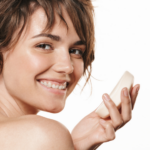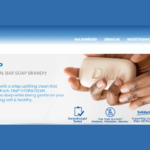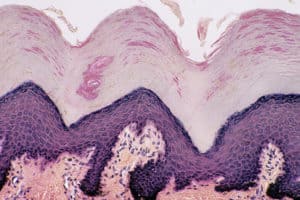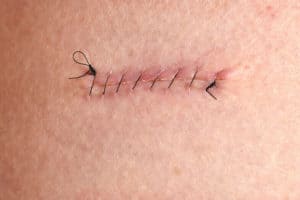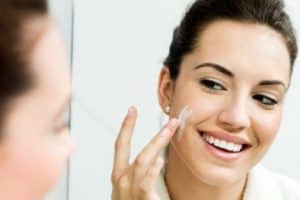Real African black soap ingredients are mostly made up of locally harvested, natural ingredients native to West Africa.
Common ingredients you will find in real African black soap are:
- Cocoa Pods
- Plantain Skin and Leaves
- Palm Oil
- Palm Kern Oil
- Coconut Oil
- Coconut Butter
- Shea Butter
The cocoa pods and plantain skins are sun-dried and roasted in clay ovens to produce ash. This ash is what gives it the dark brownish/black color with dark spots. The oils, butters, and water are then added and formed into blocks.
Read on to learn more about the real black soap ingredients and how they benefit your skin.
Also, for an excellent black soap product, take a look at our top pick, the Our Earth’s Secrets Premium Natural Raw African Black Soap:
Click here to see it on Amazon.
Real African Black Soap Ingredients
In genuine African black soap, there are certain ingredients that commonly show up. Below, I’ll list the most common ingredients and their benefits to your skin.
1. Cocoa Pod
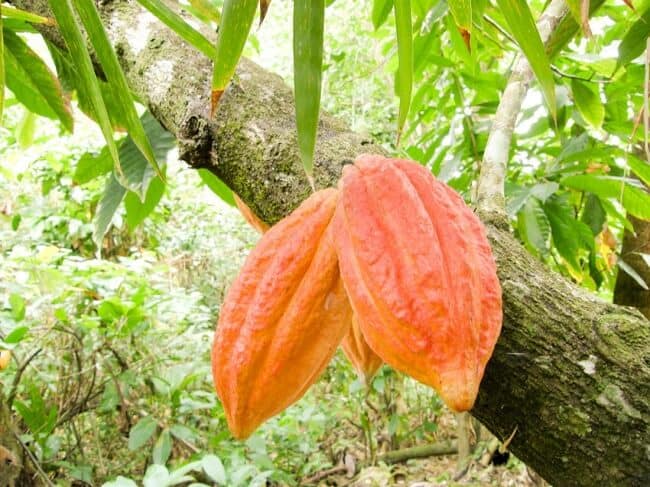
The first ingredient found in raw African black soap is the cocoa pod. The cocoa pod has powerful anti-inflammatory and antioxidant properties. It softens and tones the skin. It helps to repair damaged skin cells and helps the body fight against free radicals in the environment.
African black soaps also tend to contain a small amount of caffeine. Some people with caffeine sensitivities may need to start with a small application of the soap on the part of their skin to see if they get a negative reaction from it.
There have been some studies conducted that show caffeine can be transmitted through the skin. Most people are fine with the cocoa pod ash in the soap, but if you are very sensitive to caffeine, please just test a small amount first on your skin.
Also, the cocoa pod ash can be irritating to some people. I found it irritating when I first started using black soap but solved this by not leaving the soap on my skin for too long.
I found the solution for me was to simply the soap off after only about 20 seconds with warm water. This will help you avoid possible irritation, especially if you have sensitive skin, as I do.
2. Plantain Skin and Leaves
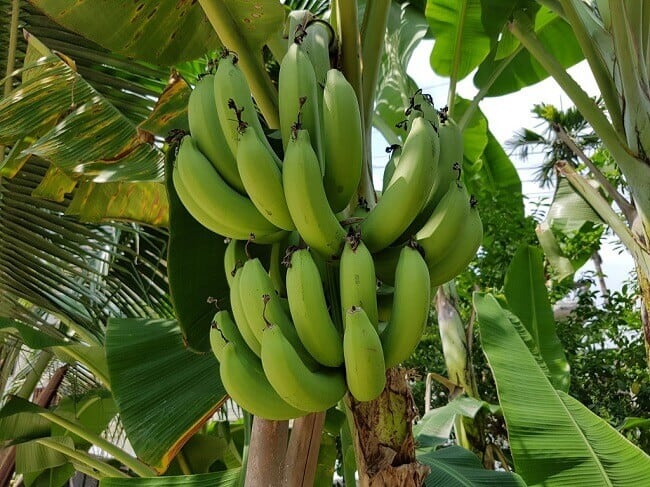
The second ingredient found in raw African black soap is the plantain skin. The plantain skin and leaves are packed with natural vitamins, including vitamin E and A. They also have a high amount of iron. Vitamin E helps calm irritated, itchy skin.
It also is beneficial for many skin conditions. It rebuilds damaged tissue in the skin. Vitamin E also helps to improve the skin texture as well as bring hydration to the skin. Vitamin A works by boosting collagen production. Collagen is vital to healthy, strong skin.
Plantains are often confused as being the same as bananas, but they are different. Plantains are longer than bananas and have thicker skin. Plantains also have natural brown spots when they are ripe and a rougher outer texture.
Bananas are, of course, eaten raw most commonly; however, plantains are cooked before eaten because while raw, they are quite bitter. Plantains are similar to potatoes with a similar flavor, just sweeter.
3. Palm Oil
The third ingredient found in raw African black soap is palm oil. Palm oil comes from the fruit of the palm tree. It is high in antioxidants as well as vitamin E. Vitamin E is beneficial for treating eczema, acne, and psoriasis. Vitamin E also helps to protect against environmental damage and free radicals.
4. Palm Kern Oil / Palm Kernel Oil
The fourth ingredient found in raw African black soap is palm kern oil (or palm kernel oil). Palm kern oil (or palm kernel oil) comes from the seed within the palm fruit. It is high in lauric acid. Lauric acid has antifungal and antibacterial properties, which help to prevent acne breakouts and eczema.
5. Coconut Oil
The fifth ingredient found in raw African black soap is coconut oil. This is an oil that has been extracted from coconut meat. It is rich in saturated fatty acids that lock in moisture to the skin so that it stays hydrated. Because of this, this oil is very beneficial for dry skin or sensitive skin types.
The oil in African black soaps helps to prevent eczema and minimize wrinkles and fine lines. Like palm kern oil, coconut oil is antifungal and antibacterial. This makes it great for removing makeup or even as a deodorant.
6. Coconut Butter
The sixth ingredient found in raw African black soap is coconut butter. Coconut butter is made from coconut flesh that’s been ground into a spreadable paste. It has similar skin benefits as coconut oil; it is just a smoother texture. It is added to help give the soap its soft, smooth texture.
7. Shea Butter
The seventh ingredient found in raw African black soap is shea butter. Shea butter comes from the seeds of the fruit of the Shea tree. It is rich in vitamins E, F, and A.
It also provides some sun protection with about SPF 6. Shea butter has essential fatty acids that give the skin the nutrients necessary to boost collagen. Shea butter helps give the black soap its luxurious, moisturizing properties.
To learn more about the ingredients in African soap, see the article on howchimp.com: Real African Black Soap Ingredients – What’s In It?
Beware of Fake African Black Soap and Fake Ingredients
Make sure you are buying genuine African black soap. Beware of products that claim to be genuine African black soap from Ghana but are fake. There are many products being sold as genuine African black soap that are not.
This does not mean that they aren’t effective, just that they are not the genuine African black soap from Ghana and may not offer the benefits they claim. Anyone selling genuine African black soap is likely to proclaim West Africa as the origin. This is important but beware of false claims.
African black soap, also known as Anago Soap, Ose Dudu, or Alata Samina, has been used for cleansing and healing skin for generations in West Africa. It helps prevent acne, as well as prevent flare-ups of eczema and psoriasis.
It even is good for cleansing and healing hair. However, with the growth in global popularity, several imitations are being sold as genuine black soap.
Nevertheless, genuine traditional African black soap is still only made in West Africa, with the best quality coming from Ghana. Because of the distance genuine African Black Soap from Ghana is shipped, and because of the scarcity of the product, it is always more expensive than regular bath soap.
What Does Real African Black Soap Look Like?
The raw soap doesn’t look like everyday bath soap, even when cut into a bar shape. The soap is also soft in texture and can be a bit crumbly. Natural raw black soap doesn’t have an artificial fragrance and is best described as having an earthy scent.
Some soap could also have a somewhat chocolate aroma because of the cocoa content. African black soap contains no artificial coloring or preservatives, with the lye coming from plantain ash used in the process.
Although called black soap, it’s never actually pure black but varies in color from a light brown to a deep black. When making black soap, plantain skins are sun-dried and then burned to ash.
The duration of this roasting process influences the color. The longer it is roasted, the blacker the skin ash is, and so the blacker the soap will be.
The use of different oils and the recipes, which vary by region, can also result in color variations.
It’s not uncommon for real black soap ingredients from West Africa to be melted with additional natural ingredients like almond oil or aloe vera gel and then remolded. These soaps share the same benefits as genuine soap.
African Black Soap Recipe: How to Make Your Own Soap At Home
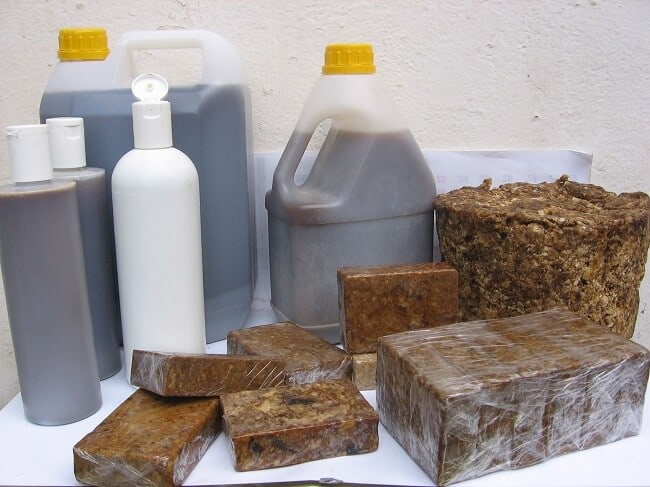
Traditionally, real African black soap is made in West Africa with a base of natural oils and butters. It’s an all-natural soap that doesn’t have any added fragrances, so it’s wonderful for a dry and sensitive skin type. It’s one of my favorites to use.
I made soap with similar natural ingredients, which are roasted plantain peels, coconut oil, palm oil, African shea butter, and raw cocoa butter. If you can’t find shea butter, just add extra coconut oil or extra cocoa butter.
I also added some activated charcoal in which isn’t authentic but mainly for aesthetic value, to make it look more authentic. I melted down all of the butters and oils.
I also added a tamanu oil which I know is not authentic but is beneficial for many skin conditions. If you haven’t heard of that, it is a wonderful tropical oil that has a very nutty smell, and I researched it – the ladies in Polynesia use it for a face oil.
They said it reduces wrinkles, fine lines, skin redness, and other skin conditions. It’s a dark brown color with dark spots, so it adds a lot to the color of this soap bar.
When making a soap bar from scratch, there needs to be a lye solution. To make the lye, solid sodium hydroxide (NaOH) must be dissolved. Sodium hydroxide beads or flakes are then poured into distilled water, and it is all stirred until fully dissolved. You then leave the lye solution to cool at room temperature.
I ground up the roasted plantain peels, added them to this lye solution, and let them steep for a while, and then strained. That is going to be our lye solution for the soap.
So it has kind of a banana smell along with the nutty smell of the tamanu oil we’re also going to be adding. I then add almond milk which gives it a nice almond scent to the soap as well all-natural fragrances. I put it in a blender and then add the plantain solution. It’s a nice rich dark brown color.
I did strain out the little pieces of plantain peel. They made the soap really hard and a little scratchy. So I’ve been straining them out ever since that first time, and I like the soap much better that way. You still have the rich scent, and you still have all the nutritional benefits to your skin of the plantain.
I also stray from the authentic product and add some vanilla bean which gives it another natural fragrance, and I like the little tiny specks. I stirred it all together and then poured it into the soap mold. After letting it sit so it goes through the gel phase, I cut it up into small blocks and wrap it with shrink wrap.
Conclusion
To sum up, here are the 7 real African black soap ingredients found in an authentic, real bar of black soap from Africa:
- Cocoa Pods
- Plantain Skin and Leaves
- Palm Oil
- Palm Kern Oil (or Palm Kernel Oil)
- Coconut Oil
- Coconut Butter
- Shea Butter
African black soap contains excellent butters and oils for sensitive skin and dry skin. It has no synthetic fragrances or oils in it, but rather it has a very pleasant, natural fragrance.
It feels amazing on the skin! Make it yourself at home, or support the local African small businesses that produce it by purchasing from them. Remember to buy genuine ones and avoid fake products.



